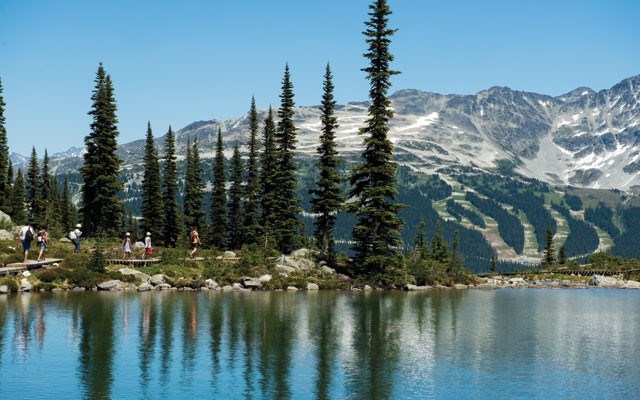Back in the early '90s, there wasn't much focus on the environment at what is now Whistler Blackcomb (WB).
An oil spill on Blackcomb Mountain in 1993 changed everything.
"It was a wake-up call, and we were at a turning point — either we become part of the solution or continue to be part of the growing problem," said Arthur De Jong, mountain planning and environmental resource manager for WB.
"And so we chose to improve our stewardship here as best we could."
The incident led De Jong and WB to envision an extensive Environmental Management System, with the goal of achieving zero waste, zero carbon and zero net emissions.
But at the time, WB didn't have the skills or capacity to tackle environmental issues on its own.
Partnerships with local and provincial governments, as well as with non-governmental organizations like the Association of Whistler Area Residents for the Environment, became crucial to the cause.
"The problems that we're trying to deal with here are global in nature, and we've only succeeded when we've partnered, so it's in our DNA," De Jong said.
"And so on the environmental agenda, it's just natural for us to work with our new owner, and it's at a critical mass."
Today, WB's new owner — Vail Resorts — is citing the local mountain operator as its inspiration for an ambitious new project dubbed "Epic Promise."
The commitment — announced on July 25 — sets Vail Resorts a target of achieving zero net emissions and zero waste to landfill by 2030, and a zero net operating impact to forests and habitat.
"It felt like the right time for us to make the commitment, both in terms of environmental leadership in our industry, but also we think that the business fundamentals behind this commitment make a lot of sense for us," said Rob Whittier, director of environmental sustainability for Vail Resorts.
Vail Resorts' acquisition of WB in August 2016 was an exciting time for Whittier.
"I was excited as anyone could be about the opportunity to engage with folks like Arthur De Jong, Allana Williams, who is their energy manager there, because Whistler has just been doing awesome things both in terms of technology and employee engagement and leadership in the energy space," he said.
"So for us, it's a great opportunity to learn from them — from snowmaking to hospitality to restaurants, they're doing amazing stuff in terms of waste reduction, so there's a lot that we can learn."
And much in the way WB relied on its partnerships to pursue its sustainability goals back in 1993, Vail will focus on its relationships as well — albeit on a much larger scale.
"One of the things I think benefits us is our size and scale... we have relationships, we can share best practices, when we acquire a resort like Whistler that's already doing some amazing things on the energy space, there is a lot that we can learn and then incorporate across our resorts," Whittier said.
"It is our scale that allows us to do some of the things that we're talking about, which may involve sizable investments in offsite wind or solar projects."
To achieve its targets, Vail will look to reduce electricity and natural gas use by another 15 per cent, investing $25 million in projects like low-energy snowmaking, green building design and more efficient grooming practices and equipment.
The company will also aim to purchase 100 per cent renewable energy equivalent to its total energy use and work with governments and energy utilities to bring more renewable energy to the grids where it operates resorts.
Vail Resorts also plans to invest in tree planting, engage with its vendors and suppliers to collaborate on emission reduction throughout the supply chain and better educate guests.
On the waste-to-landfill front, Vail Resorts plans to divert 100 per cent of its waste to more sustainable pathways (the company is currently at a 40-per-cent diversion rate across its entire operations).
It has also committed to minimizing or eliminating forest and wildlife impact of any future resort development, planting or restoring an acre of forest for every acre displaced, and continuing to expand its commitment to partner with and fund local organizations focused on forest and wildlife habitat health.
But it won't be easy.
De Jong describes WB's progress to date as a road marked by wins and losses.
The company's annual sustainability report showed a six-per-cent drop in hydro consumption from 2015 to 2016 and an eight-per-cent drop in waste generation over the same period, "which is great news," De Jong said.
"But we also increased our hydro carbon use, principally, the amount of fuel we use, diesel fuel for our grooming fleet, went up by 4.3 per cent.
"All arrows don't go in a positive direction when you're doing this."
But advances in technology in the coming years could revolutionize the project — De Jong predicts that hybrid grooming equipment, still very much in the testing phase, could drop fuel consumption another 40 per cent in the near future.
Advances in snowmaking technology — which account for a third of WB's hydro use — will be revolutionary as well.
The impacts of climate change will affect the mountain resort industry in more ways than one, De Jong added.
"If the global temperature goes up several more degrees, we might become irrelevant — not because we don't have snow... but the associated water shortages and thereby food shortages creating geo political conditions, that are in some ways probably hard to imagine today, could render us irrelevant," he said.
"And that's why we understand the big picture, and Vail (Resorts) understands the big picture... this is certainly a thing we need to do."
See related story on Page 34.




